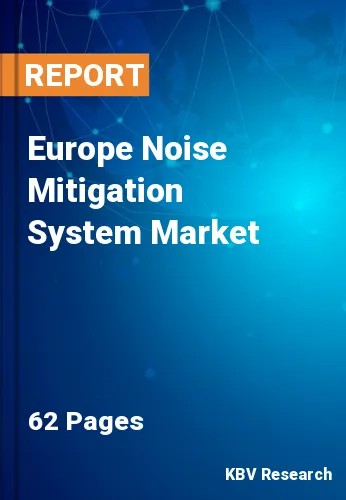The Europe Noise Mitigation System Market would witness market growth of 4.6% CAGR during the forecast period (2022-2028).
A radioactive gas radon, naturally released from water, rocks, and soil, can impair people's health and leak into structures through fissures and other foundational openings. Installing a radon mitigation system, which often includes a fan to expel the gas outdoors, lowers the concentrations of radon in a building. However, noise can be produced by this fan or even the radon mitigation system. The amount of noise can vary based on several factors, including the fan type, position, and building architecture.
The demand for noise-mitigating systems featuring radon fans is rising as people become more aware of the dangers of radon gas. In addition to fans, other parts can be utilized to lessen fan noise and improve the system's comfort for building occupants, such as mufflers or insulated ducts. Technology for noise mitigation systems has a few major trends.
Using active noise control, or ANC, is one of them. In order to eliminate noise, this technique generates opposing sound waves after using sensors to identify potential sources of noise. In various settings, including homes, workplaces, and transportation, it can be utilized to lessen noise. Soundproofing materials are a further significant trend. Sound can be blocked or absorbed using these materials, which makes it more acceptable and less unpleasant. This is very helpful in settings like hospitals or factories, where absolute stillness is either impractical or undesirable.
Advancements in the automotive industry encourage the use of microelectronics in the nation, creating attractive options for the noise mitigation system market growth in Germany. According to a European Parliament and Council decision, noise levels must be decreased or eliminated through administrative and engineering restrictions. The lower exposure action level is 80 dBA for 8 hours with a 135 dB peak SPL, and the upper exposure action level is 85 dBA for 8 hours with a 137 dB peak SPL, according to this directive. With maximum levels of 140 peak dBSPL for 8 hours, levels of exposure are 87 dBA. All these factors will propel the market's growth in the coming years.
The Germany market dominated the Europe Noise Mitigation System Market by Country in 2021, and would continue to be a dominant market till 2028; thereby, achieving a market value of $3,193.5 Million by 2028. The UK market is anticipated to grow at a CAGR of 3.7% during (2022 - 2028). Additionally, The France market would exhibit a CAGR of 5.4% during (2022 - 2028).
Based on Product Type, the market is segmented into Acoustic Tiles, Baffles, Acoustic Surface, Sound Barrier Walls, and Others. Based on Application, the market is segmented into Industrial, Commercial, and Residential. Based on countries, the market is segmented into Germany, UK, France, Russia, Spain, Italy, and Rest of Europe.
Free Valuable Insights: The Worldwide Noise Mitigation System Market is Projected to reach USD 46.8 Billion by 2028, at a CAGR of 5%
The market research report covers the analysis of key stake holders of the market. Key companies profiled in the report include Armstrong World Industries, Inc., Yamaha Corporation (Menchey Music Service, Inc.), Catalyst Acoustics Group (The Stephens Group), SysTech Design, Inc., Acoustical Surfaces, Inc., McGill AirSilence LLC, Knauf Gips KG (Gebr. Knauf KG), Metal Form Manufacturing LLC (United Enertech Corporation) and Quietstone UK Ltd.
By Product Type
By Application
By Country
Our team of dedicated experts can provide you with attractive expansion opportunities for your business.

